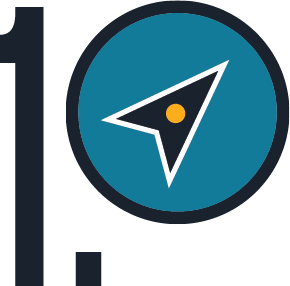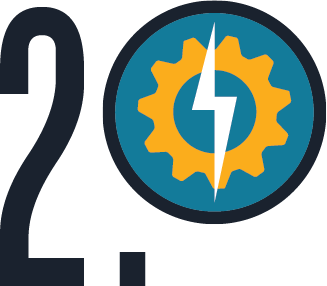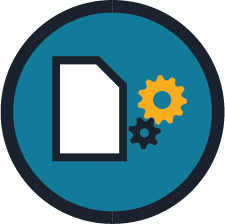what isLINK BUILDING
— A Beginner’s Guide | 2017 —
Link Building
/ liNGk bild•iNG / verb.
Link building (also known as link-building and linkbuilding) is the practice of promoting your website to other website owners with the primary goal of securing a link (hyperlink) on their site to your page.
WHY DO BUSINESSES INVEST TIME AND RESOURCES IN LINK BUILDING?
If you have a website and want traffic from search, you need to consistently secure good links from relevant websites. That means link building.
Link building requires strong social skills, excellent communication, persistence, and creativity. It’s marketing, sales, and psychology combined.
WHY WOULD A BUSINESS INCLUDE LINK ACQUISITION IN THEIR MARKETING?
1.
Links are valuable in search engine optimization (SEO).
Links area strong ranking factor in Google’s (and other search engines’) search algorithm.
2.
Links are valuable in audience development.
Securing a link on another website gives another audience direct access to your website, and can pass referral traffic.
3.
Links are valuable for marketing.
A link is a vote of confidence from one website to another. Each link createsa positive connection and developsa relationship.
Links are vital to increasing traffic online. A website without links isn’t going to get any traffic — from search, or from other websites.
That’s the short, nitty-gritty explanation. Now let’stake a deeper look.
Navigation
A Link Building Basic Overview
The What:
Link building is the process of securing a link on an independent website back to your own site (or a client’s).
The Why:
Google search is based around links. The more links you have from relevant and authoritative websites, the better your website will perform in search for relevant queries. Links also drive referral traffic and help develop relationships.
The How:
SEOs use customized strategy with diverse tactics designed to convince another website it is in their — or their audience’s — best interest to link to apage on your site.
The When:
Link building gained popularity with the rise of Google in 1998, and is still vital today in 2017.
The Who:
SEOs, marketers, and website owners use link building to increase traffic to their site through search.
the Value
OF Link Building
Links are fundamental to the existence of the web.
In fact, it’s called the web due tolinks — links are the ‘webbing’ that combine the millions of websites into one entity, creating the interconnected web.
There are two primary reasons marketers and businesses should be concerned with links:

Links are the primary means of online navigation, directing humans from one web page to another. Humans inherently associate links as a signal of authority and trust.

Search engines (e.g. Google) consider links a “vote of confidence” from one website to another, and use links as a signal of authority, trust, and relevance.
Links are valuable for marketing, audience development, relationship building, and search engine optimization.
Navigating The Web
Links are the primary means of navigating the web.
WITHOUT LINKS, THE INTERNET WOULD BE UNNAVIGABLE.
There are essentially three ways to navigate to a page:
- Bookmark a page.
- Type the full URL path into your browser.
- Click a link.
Links account for the vast majority of web navigation. Whether in social media, search, or browsing a popular site like Reddit, odds are you’re clicking links to move from one page to another.
Memorizing URLs and creating thousands of bookmarks simply isn’t practical.
Links power the web, and are absolutely critical to search, website architecture, user experience (UX), audience development, and human accessibility.
Links as a ranking signal
SEARCH ENGINES USE LINKS AS A CORE RANKING SIGNAL.
Search is responsible for much of the internet’s traffic — one study by Conductor reports more than 60%. When Google unexpectedly crashed in 2013 40% of Internet traffic dropped.
Search is a primary channel of traffic for most businesses online.
An entire industry exists around optimizing websites for search, improving their performance: search engine optimization (SEO).
Link building is an important part of SEO. Without links, websites can’t rank in competitive search queries.
Google’s core system, which led to their dominance as a search engine, is PageRank. PageRank is Google’s algorithm that places value on links, and affects websites’ ranking within search.
Humans and search engines both place considerable value on links, and securing links online requires sustained, focused effort.
Intentional Links
Quality links don’t happen by accident.
GOOD LINKS REQUIRE INTENTIONAL EFFORT.
Google often tells website owners to “create great content.” You need to be creating pages that provide value to your audience.
But valuable content requires promotion. If you want to secure the links your website deserves, you need to be intentional about promoting your pages to websites where your links make sense.
Links don’t happen, otherwise.
According to a 2015 joint study by BuzzSumo and Moz, the majority of posts online have zero external links (links from other websites).
The majority of content online has no real chance to receive significant search traffic, which is responsible for the majority of traffic online.
SEOs know the impact a few natural links from quality and relevant websites can have. It no longer takes hundreds or thousands of links to rank. The commodity of a single link has vastly increased, giving quality websites even more power within their respective industries.
In order to secure a link, you need to demonstrate value in a persuasive manner.
Further Reading
- The Value of Links — Search Engine Watch
- Content, Shares, and Links: Insights from Analyzing 1 Millon Articles — Moz and BuzzSumo
- Can You Rank in Google Without Links? New Data Says Slim Chance — Moz
- The PageRank Citation Ranking: Bringing Order to the Web — Larry Page and Sergey Brin
- Organic Search is Actually Responsible for 64% of Your Web Traffic — Conductor
- Google Goes Down for 5 Minutes, Internet Traffic Drops 40% — CNET
how Search Works
Links are important to humans, marketers, and internet usability. Google search is also reliant upon links, both for ranking and crawling.
CRAWLING?
YEP!
WITH (ROBOT) SPIDERS.
Let’s take a deeper look at how specifically search works.
Google crawls the web by following links (again making search reliant upon links), creating an index from the pages they find. When you use search you’re not searching the live web, but rather Google’s index of the web.
Google stores their index in numerous data centers, which are incredibly large and complex.
Google’s last reported index size is roughly 130 TRILLION pages, taking up over 100 million gigabytes.
How does Google know which pages to return for a given search (query)? How do they determine which pages are relevant? How do they rank and order those pages?
Google uses algorithms, both machine learning and human coded (by Ranking Engineers), to determine the most relevant results.
There are over 200 ranking signals used by Google’s search algorithm. No one knows precisely what these signals are (or even the strength given to each signal) — though many speculate.
SEO Categories
Technical, On-page, and Off-page (links).
There are three different categories of optimization you can perform to improve your website in search:

Technical SEO

On-Page SEO

Off-Page SEO
Technical SEO is the optimization of technology involved in Google crawling and indexing your site. This includes domain architecture, technology stack, robots.txt, server codes, redirects, page speed, internal links, etc.
On-page SEO is the optimization of the content and HTML of your site’s pages themselves. This is a more granular view of the elements on the page, which help Google understand the topic and intent of the page. This includes the words on the page, the URL, title, header tags, images, meta tags, etc.
Off-page typically refers to links, although it can also include citations.
Off-page SEO
typically
refers to
links.
Technical and on-page SEO are crucial — you’ll never rank to your site’s full potential without clean, optimized on-page and technical SEO. Fortunately you should largely havecontrol over these elements, which are the direct result of how you build your website and its platform.
Technical and on-page SEO both become much more complex as you scale a website (increasing the number and size of pages), and involve more technology.
Off-page is the element you least control in SEO. It requires convincing another website to provide positive signals to your site, which doesn’t happen without a good cause.
Links have perhaps the most ranking value of any single signal. They’re absolutely critical to ranking in competitive search.
Securing a link from an authoritative website in a relevant manner isn’t easy. Google’s original algorithm succeeded because it used links as a core ranking signal, which no other search engine used at the time.
How Google Makes Money
Google’s concern is the same as any business: making money.
MAKE MONEY
MONEY, MAKE
MONEY MONEY
MONEY!
Google’s primary source of revenue is from search. In fact, before Google split to become Alphabet, search was responsible for the majority of revenue — despite many successful side projects (which have now become their own businesses, under Alphabet).
How does Google make money from search, which is free? With advertisements, at the top or bottom of the search results page. This is an incredibly big business. Google reported $74.5 billion in revenue in 2015, with a consistent growth year-over-year.
To ensure they continue to make money fromsearch, the core of their company, Google has to do two things.
